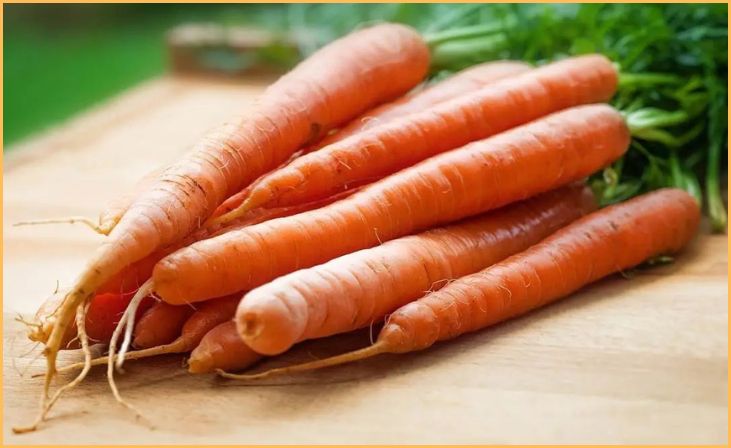When it comes to vegetables, the age-old debate of raw vs. cooked vegetables has been ongoing. While there’s no one-size-fits-all answer, there are instances where cooking vegetables can actually make them healthier. In this article, we’ll explore six cooked vegetables that are healthier than their raw counterparts and the science behind this culinary transformation.
Before delving into the specific vegetables, it’s essential to understand the science behind why cooking can enhance their nutritional value. Cooking can break down tough cell walls, kill harmful bacteria, and make certain nutrients more accessible and easily digestible.
Top Cooked Vegetables Healthier Than Raw
This blog explores the lesser-known fact that cooking can render some vegetables even healthier, unlocking essential nutrients and making them more bioavailable. Let’s delve into the science behind this phenomenon and discover six vegetables that take a nutritional leap when subjected to the heat of the kitchen.
Tomatoes
Tomatoes, a kitchen staple enjoyed in various forms, undergo a unique transformation when exposed to heat. Cooking tomatoes doesn’t just alter their texture and flavor; it enhances their nutritional profile significantly. The standout benefit is the lycopene boost – a powerful antioxidant found in tomatoes. Cooking increases the bioavailability of lycopene, making it more easily absorbed by the body. Lycopene is renowned for its potential to reduce the risk of certain cancers, marking cooked tomatoes as a flavorful and healthful addition to meals.
Whether simmered into a rich pasta sauce, roasted for a burst of flavor, or incorporated into soups, the lycopene infusion during cooking adds both depth and potential health benefits to this versatile and beloved fruit. So, next time you savor a bowl of hearty tomato soup or relish a slow-cooked marinara, know that the lycopene boost is just one of the savory advantages that cooking brings to these vibrant red gems.
Quick Link: Top 10 Nutritious Vegetables Recommended by Nutritionists
Carrots

While carrots are commonly enjoyed as a crisp and refreshing snack, their health benefits take an interesting turn when subjected to the heat of cooking. Beyond the satisfying crunch, cooking carrots presents a unique advantage: enhanced beta-carotene absorption. The process of cooking breaks down the tough cell walls of carrots, making the beta-carotene within more accessible to the body. This increased accessibility aids in the body’s conversion of beta-carotene into vitamin A, a crucial nutrient known for promoting optimal vision and overall health.
Whether roasted to caramelized perfection, steamed to retain their vibrant color, or added to soups for a comforting touch, cooked carrots offer a delightful combination of taste and nutritional benefits. So, next time you indulge in a hearty carrot dish, appreciate not just the flavor but also the boosted availability of this essential nutrient, contributing to your well-being with every savory bite.
Spinach
Spinach, celebrated for its versatility and nutritional richness, undergoes a transformative process when introduced to cooking. The key advantage lies in the reduction of oxalic acid, a naturally occurring compound found in spinach. Oxalic acid, while present in various foods, can hinder the absorption of vital minerals such as iron and calcium. Cooking spinach mitigates this challenge by decreasing its oxalic acid content, facilitating the body’s absorption of these essential nutrients.
Whether lightly sautéed, added to flavorful stir-fries, or incorporated into hearty casseroles, cooked spinach not only offers a pleasing texture but also enhances its nutritional profile. This cooking method ensures that spinach becomes a more efficient source of iron and calcium, contributing to overall well-being. So, whether you prefer it as a side dish or a main ingredient, cooked spinach stands as a delicious and nutrient-dense addition to your culinary repertoire.
Asparagus

Asparagus celebrated as a culinary delicacy, unveils unique benefits when subjected to the art of cooking. Beyond its exquisite flavor and tender texture, cooking asparagus plays a crucial role in enhancing its digestibility. The cooking process breaks down tough fibers, making nutrients more readily available for absorption. This includes a spectrum of vitamins and minerals, such as folate, vitamin K, and iron, that are essential for overall health. Whether gently steamed to preserve its vibrant color or roasted for a caramelized touch, cooked asparagus becomes not only a delightful addition to meals but also a more nutritionally accessible one.
The improved digestibility ensures that the body can efficiently absorb the wealth of nutrients present in this elegant green vegetable, contributing to a balanced and nourishing diet. So, whether gracing your plate as a side dish or taking center stage in a culinary creation, cooked asparagus brings not just gourmet appeal but also heightened nutritional benefits to the dining experience.
Mushrooms
Mushrooms, beloved for their earthy flavors and versatile uses in the culinary world, undergo a transformative journey when introduced to the heat of cooking. Beyond their delectable taste and unique textures, cooking mushrooms unlocks a treasure trove of nutritional benefits. The process of cooking mushrooms facilitates the release of essential nutrients, including B vitamins like riboflavin and niacin, as well as vital minerals such as selenium and potassium. This nutrient release enhances the overall nutritional value of mushrooms, making them even more valuable contributors to a balanced and health-conscious diet.
Whether sautéed to golden perfection, grilled for a smoky essence, or simmered in savory stews, cooked mushrooms not only elevate the culinary experience but also offer a more bioavailable and nutrient-rich addition to your meals. Embracing the cooked form of these fungi ensures that you savor not just their rich flavors but also the enhanced nutritional goodness they bring to the table, enriching your culinary adventures with every savory bite.
Also Read: 8 Vegetables That Aren’t As Nutritious As You Think
Pumpkin

Pumpkin, a beloved seasonal favorite, takes on a new dimension of health benefits when subjected to the transformative power of cooking. Beyond its association with cozy fall flavors, cooking pumpkin is a strategic move to enhance nutrient absorption. The process of cooking not only amplifies the rich, earthy flavor of pumpkin but also makes its nutrients, notably beta-carotene, more readily absorbed by the body. Beta-carotene, a precursor to vitamin A, is a crucial nutrient linked to maintaining good vision and supporting immune health.
Whether roasted to perfection, blended into velvety soups, or incorporated into delectable baked goods, cooked pumpkin becomes a delicious vessel for not just warmth and comfort but also heightened nutritional value. Embracing the cooked form of this autumnal gem ensures that you relish not only its seasonal charm but also the optimized absorption of essential nutrients, contributing to a health-conscious and flavorful fall culinary experience.
Bottom Line
In the world of nutrition, the raw versus cooked debate takes an interesting turn as certain vegetables reveal hidden benefits when subjected to heat. Cooking not only enhances the flavors but can also unlock nutritional potential, making some vegetables healthier in their cooked form. While the choice between raw and cooked often depends on personal preference, incorporating both into your diet can offer a comprehensive range of nutrients. The key lies in striking a balance and embracing the diverse ways vegetables can be enjoyed to maximize both taste and nutritional benefits.
FAQs
While cooking can lead to some nutrient loss, it also enhances the bioavailability of certain nutrients. Steaming, roasting, or boiling can make certain antioxidants and vitamins more accessible to the body.
Several vegetables, including tomatoes, carrots, spinach, asparagus, mushrooms, and kale, exhibit increased nutritional benefits when cooked. Cooking breaks down cell walls and releases nutrients that might be harder to access in the raw form.
To retain the maximum nutrients, opt for cooking methods like steaming, microwaving, or roasting at lower temperatures. These methods can preserve the nutritional content better than high-heat methods like frying.
Yes, overcooking can result in nutrient loss. It’s essential to find a balance and avoid prolonged high-heat cooking methods. Monitoring cooking times and opting for gentler methods can help preserve the nutritional value of vegetables.







